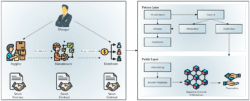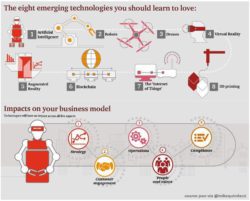The convergence of the Internet of Things (IoT) and blockchain technology has given birth to a transformative force that is reshaping business models across industries. This powerful synergy allows businesses to create new revenue streams, enhance operational efficiency, and unlock unprecedented levels of transparency. In this comprehensive article, we delve into the world of IoT blockchain for business models, exploring ten exemplary use cases, the benefits it brings, the challenges it faces, and the promising future it holds.
Top 10 Examples of IoT Blockchain for Business Models
- Supply Chain Transparency: By integrating IoT sensors with blockchain, businesses can track the journey of products from raw materials to the end consumer. This transparency reduces fraud, ensures authenticity, and boosts consumer trust.
- Smart Contracts for Logistics: Automating supply chain processes through smart contracts ensures real-time execution of agreements between suppliers, manufacturers, and distributors, reducing delays and disputes.
- Asset Tracking: IoT sensors can be used to track high-value assets in real time. Blockchain provides an immutable record of asset movements, reducing theft and improving asset management.
- Energy Management: IoT-enabled devices can optimize energy consumption in buildings and factories. Blockchain ensures transparent billing and facilitates peer-to-peer energy trading.
- Automotive Industry: Connected vehicles generate vast amounts of data. Integrating blockchain can enable secure data sharing between manufacturers, service providers, and consumers, enhancing vehicle safety and maintenance.
- Healthcare Data Sharing: IoT devices in healthcare can securely share patient data across providers, improving diagnostics and treatment. Blockchain ensures data integrity and patient consent.
- Agricultural Supply Chain: From farm to table, IoT devices and blockchain can track the journey of produce, ensuring quality, reducing waste, and increasing accountability.
- Waste Management: IoT-enabled waste bins can communicate their fill levels to waste collection services. Blockchain ensures accurate billing and incentivizes proper waste disposal.
- Retail Loyalty Programs: IoT devices can enable automatic rewards for customer interactions. Blockchain ensures the secure issuance and redemption of loyalty points.
- Smart Cities: IoT sensors in urban infrastructure can enhance traffic management, waste collection, and public services. Blockchain secures data integrity and enables decentralized governance.
We’re tapped into the emerging technologies that are driving #4IR and opening the doors to new business models. Find out what IoT, blockchain, 3D printing and AI mean for your business: https://t.co/0YWUni8UKn https://t.co/KkB7FYLxgJ
— Don James (@DonaldPJames) March 13, 2019
Benefits of IoT Blockchain for Business Models
- Enhanced Data Integrity: Blockchain’s immutable ledger ensures that data from IoT devices remains tamper-proof, preserving the integrity of critical information.
- Trusted Transactions: IoT devices can autonomously execute transactions through smart contracts on the blockchain, reducing the need for intermediaries and enhancing trust.
- Secure Data Sharing: With blockchain’s cryptographic encryption, IoT-generated data can be securely shared among authorized parties while protecting sensitive information.
- Streamlined Auditing: Auditing processes become efficient and transparent as blockchain records every transaction, simplifying compliance and reducing audit costs.
- Decentralized Control: Blockchain enables decentralized control in IoT networks, eliminating single points of failure and enhancing resilience against attacks.
- Enhanced Supply Chain Visibility: Businesses can gain real-time insights into their supply chains, allowing them to respond quickly to disruptions and optimize processes.
- New Revenue Streams: IoT devices can be monetized directly through blockchain-enabled micropayments, creating innovative revenue streams for businesses.
- Automated Compliance: Smart contracts can ensure that IoT devices adhere to regulations, automatically taking actions to remain compliant.
- Consumer Trust: The transparency of blockchain reassures consumers about the authenticity and origins of products, bolstering their trust in the brand.
- Efficient Settlements: Blockchain facilitates quicker settlements between parties, reducing payment processing time and associated fees.
Also, read – What Is Metaverse Of Things(MoT) And How It Is Different From Internet Of Things (IoT)
Challenges of IoT Blockchain for Business Models:
- Scalability: As IoT generates massive amounts of data, scaling blockchain networks to handle the load is a significant challenge, often resulting in slower transaction speeds.
- Interoperability: Ensuring that various IoT devices can communicate and integrate seamlessly with different blockchain platforms requires standardized protocols.
- Data Privacy and Compliance: IoT-generated data often contains sensitive personal information. Adhering to data privacy regulations while using a public blockchain can be complex.
- Energy Consumption: Consensus mechanisms like proof-of-work can be energy-intensive, especially for IoT devices with limited power resources.
- Complexity: The integration of IoT devices with blockchain requires specialized expertise, making the development and maintenance of such systems complex.
- Cost: Developing and maintaining IoT blockchain solutions can be cost-prohibitive, especially for small and medium-sized enterprises.
- Regulatory Uncertainty: Rapid technological advancements often outpace regulatory frameworks, creating uncertainty in compliance and legal aspects.
- Lack of Standards: The absence of universal standards for IoT devices and blockchain protocols hampers seamless integration.
- Cybersecurity: While blockchain enhances security, IoT devices can be vulnerable to cyberattacks, posing risks to the integrity of the entire network.
- Education and Awareness: The intricate nature of IoT blockchain solutions necessitates a skilled workforce. The shortage of professionals with expertise in both areas can hinder adoption.
Embracing IoT blockchain for business models is a balancing act between reaping the benefits and addressing the challenges. While the potential for enhanced data security, transparency, and new revenue streams is significant, the hurdles of scalability, interoperability, and privacy must be navigated.
As technology advances and solutions to challenges are developed, businesses stand to transform their operations, enhance customer experiences, and create innovative value propositions. The synergy between IoT and blockchain is a journey towards a future where trust, efficiency, and innovation harmoniously coexist, revolutionizing how industries operate and interact.
The Future of IoT Blockchain for Business Models
The future of IoT blockchain is promising, with ongoing research and innovation aimed at addressing its challenges. As scalability solutions and interoperability protocols improve, the integration of IoT and blockchain will become more seamless.
In this future landscape, businesses will operate within interconnected ecosystems of trust, where IoT devices collaborate autonomously while blockchain ensures data security and transparency. Supply chains will be more resilient, energy consumption more sustainable, and processes more efficient.
Conclusion: A New Dawn for Business Models
IoT blockchain is not just a technological trend; it’s a paradigm shift that empowers businesses to evolve their models in ways previously unimaginable. The fusion of IoT’s data-generating potential with blockchain’s security and transparency will enable businesses to create value, enhance customer experiences, and drive innovation. While challenges persist, the potential benefits far outweigh them.
As the synergy between IoT and blockchain deepens, a new dawn rises for business models, setting the stage for a future where connectivity and security coexist in harmony, and industries are propelled forward by the transformative forces of innovation.
Stay informed with daily updates from Blockchain Magazine on Google News. Click here to follow us and mark as favorite: [Blockchain Magazine on Google News].
Disclaimer: Any post shared by a third-party agency are sponsored and Blockchain Magazine has no views on any such posts. The views and opinions expressed in this post are those of the clients and do not necessarily reflect the official policy or position of Blockchain Magazine. The information provided in this post is for informational purposes only and should not be considered as financial, investment, or professional advice. Blockchain Magazine does not endorse or promote any specific products, services, or companies mentioned in this posts. Readers are encouraged to conduct their own research and consult with a qualified professional before making any financial decisions.

